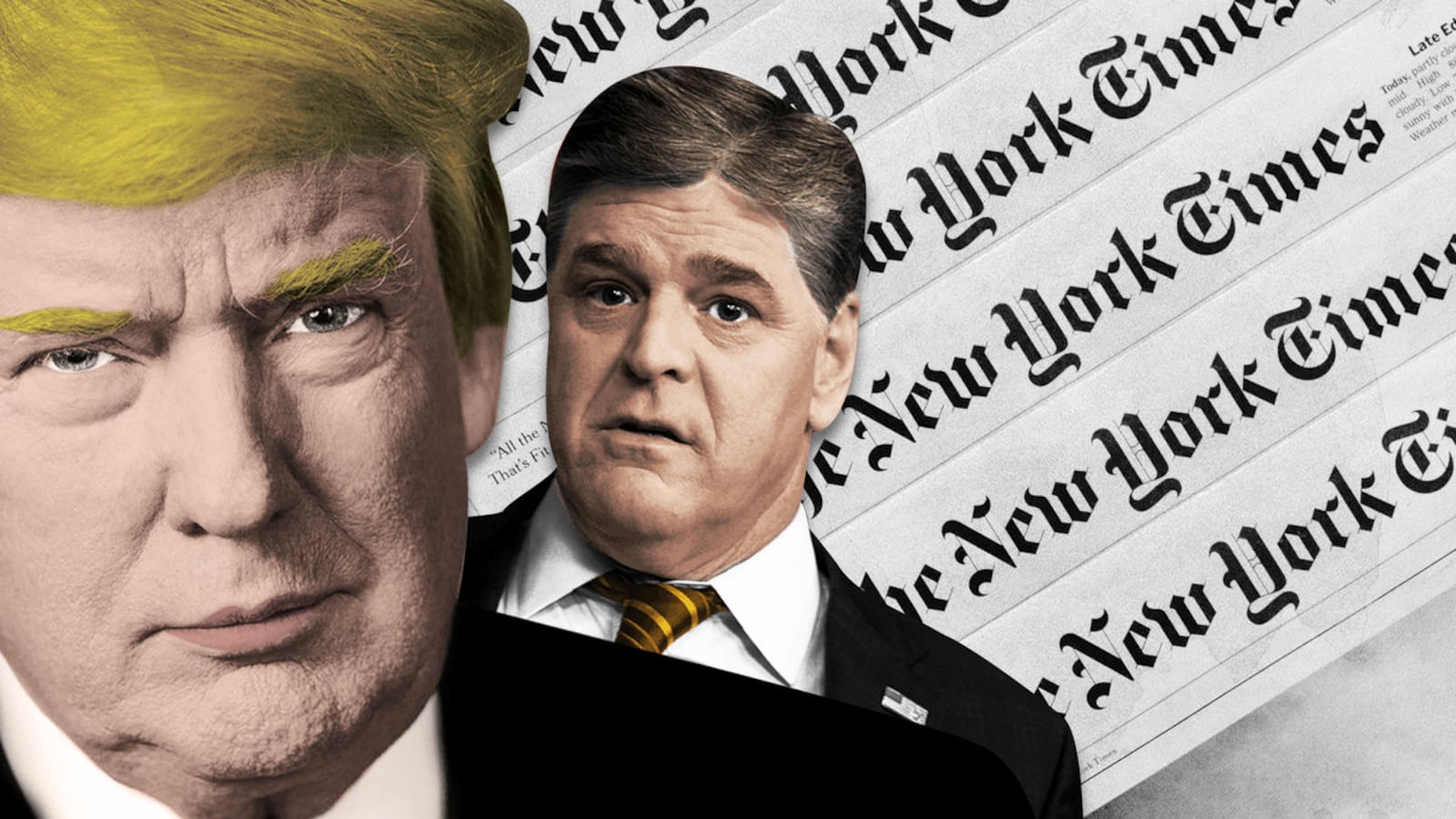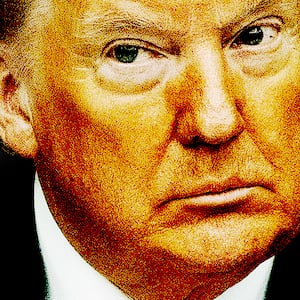Over the past month, as Fox News personality Sean Hannity seethed over his—and his network’s—treatment in The New York Times, one of the host’s closest friends quietly encouraged him to exact some revenge on the newspaper for reporting that Hannity had downplayed the threat of the coronavirus.
This particular friend was none other than President Donald Trump, who at the time was busy overseeing the federal response to the pandemic and resulting U.S. economic implosion, as his re-election campaign was also filing lawsuits against various local and national media outlets.
According to two people familiar with the matter, Trump had privately gossiped with Hannity—a prominent informal adviser to this president and one of Trump’s preferred late-night phone buddies—about the Fox host’s desire to make an example of the Times. Though President Trump thought it was a good idea for Hannity to explore legal action against the news outlet, one of the two sources stressed that it “wasn’t the president’s idea” for Hannity and his attorney to shoot off a threatening letter to the Times. Trump did not order or direct Hannity to do so, this source said.
A third person with knowledge of the situation said that for the past month the president had repeatedly complained to advisers that he and other Trumpworld figures should consider lawsuits for all the “lies” news outlets have supposedly told about them during the coronavirus crisis. This source said they were aware of an instance when Trump directly conveyed the sentiment to Hannity and at least one other conservative media personality.
Trump and Hannity happen to share a lawyer: The man who signed the 12-page letter to the Times is Charles Harder, the celebrity attorney infamous in media circles for the Hulk Hogan lawsuit that eventually killed the news and gossip website Gawker. Harder has also done legal work and issued a variety of legal threats on behalf of both the 2020 Trump campaign and the president himself. The lawyer represented first lady Melania Trump in a successful battle with the Daily Mail.
The legal threat comes as the network has been under the microscope for its coverage of the pandemic, and its skepticism of the danger of the virus by some of its popular hosts. Laura Ingraham, another informal adviser to Trump, has repeatedly downplayed the danger of the virus, encouraging Americans to buy flights and urging states to reopen their economies despite risks to workers. The network also quietly cut ties with Fox Nation hosts and Trump pals Diamond & Silk after the duo peddled coronavirus conspiracy theories online, and sister channel Fox Business ditched Trish Regan following her jeremiad against the “coronavirus impeachment scam.”
A White House spokesperson did not respond to requests for comment on this report, and neither did Harder. Hannity, in a statement to The Daily Beast, insisted that he had not spoken to Trump specifically about Harder or Monday’s letter. (The Daily Beast wasn’t planning on reporting that, and the cable-news host did not respond to additional inquiries asking him to weigh in on our actual reporting.)
Hannity also added, unprompted, that he was never represented by Michael Cohen, even though The Daily Beast did not ask him any questions about Trump’s former fixer on Tuesday.
“Fake news,” Hannity said. “I never spoke with the president nor consulted with him about my attorney’s letter to The New York Times or who I should hire. And as previously stated, Michael Cohen was never my attorney.”
Cohen, one of Trumpworld’s most famous turncoats, did secretly provide Hannity with legal counsel, a topic that Hannity has been sensitive about ever since it was publicly revealed in 2018. By the Fox host’s own admission, he had “brief discussions with [Cohen] about legal questions that I wanted his input and perspective on.” Hannity has long denied that this in any way meant that Cohen had served as his lawyer.
On the March 18 edition of his radio show, Hannity touted Harder and Lin Wood—a defamation lawyer who represented falsely accused Olympic bomber Richard Jewell as well as the parents of Jon Benet Ramsay—as contenders to go after outlets that he believes have slandered him.
“I need to hire Lin Wood and Charles Harder and just make this a test case of slander, besmirchment, character assassination,” he said on his iHeartRadio program.
When contacted Tuesday, Wood declined to comment on whether or not Hannity had reached out to him for representation and was equally silent on the validity of the legal threat Harder had sent the Times. “Sean has hired one of the best,” Wood said, explaining that he had not read Harder’s missive to the Times. “I doubt Charles Harder writes frivolous letters. He doesn’t file frivolous lawsuits either. I would think The New York Times would take any letter Charles Harder sends seriously.”
Wood continued, “I think the world of Sean Hannity for what he did for Richard Jewell. Richard always appreciated it and I never forgot it. Sean Hannity showed incredible journalistic judgment.”
This would not be the first time Harder has threatened legal action against the Times. As Emily Smith of Page Six reported Oct. 5, 2017, just hours after The New York Times revealed decades of sexual abuse and coverups by Harvey Weinstein, Harder was cited as a lawyer for the once-lauded film producer in the article under an “exclusive” banner stating “Harvey Weinstein plans to sue New York Times for $50 million.”
No lawsuit was ever filed.
This week, Harder used some of his considerable bark to again hassle the Times, this time on behalf of Hannity. On Monday, the lawyer said in the letter that the Times had engaged in “blatant and outrageous disregard for the truth” in a recent series of articles involving Hannity’s own coverage of the novel coronavirus. The letter disputed multiple New York Times articles that described Hannity as downplaying the threat of coronavirus (though Hannity dismissed the health risks of coronavirus for younger people, and at one point described Democrats as pushing a “new hoax” on virus fears).
Harder, in his letter, also singled out an April 18 column by Ginia Bellafante in which a woman described how her father, a regular Hannity viewer, died from coronavirus after watching Fox News coverage of the virus and deciding to go forward with a pre-planned vacation in March. The Fox host’s lawyer said Hannity’s description of the threat of the coronavirus cited in the Times piece came after the individual had already left for vacation.
The Times pushed back against Harder’s letter, saying in a statement Monday evening that there was “no basis for a retraction or an apology.” In a subsequent letter to Harder on Tuesday, Times lawyer David McCraw offered a one-word response to Hannity’s demands for a retraction and apology: “No.”
Hannity’s friend and mutual cheerleader President Trump has long been a fan of legal salvos against his enemies in the media and celebrity circles. His appetites for these attempts at legal intimidation predate his ascension to the highest office in the land by many years.
“Back around 2013, [online organizer] Angelo Carusone was launching a boycott campaign or drop-him campaign against [then-future] President Trump and his corporate sponsors, and I called him and he wasn’t even that aware of it, but I explained to him what [it] was, and I told him, ‘You should sue them for tortiously trying to interfere with your business relationships,” said Sam Nunberg, a former political adviser to Trump and a lawyer by training. “Then a couple weeks after or so, I saw that President Trump and his lawyer had sent a letter to [Carusone].”
Nunberg added that he had “never been a part of the media lawsuits stuff that he loves,” describing some of them as “these frivolous lawsuits” that “all get thrown out of court.”
The president hasn’t stopped using legal threats and libel claims. Since 2015, Trump has privately urged various friends and political allies to sue media outlets for engaging in aggressive coverage, according to three individuals who say they’ve received these kinds of unsolicited phone calls from Trump.
Early on during his 2016 presidential campaign, for instance, Trump was watching a Fox News segment in which two hosts were arguing about Trump’s candidacy. One of the hosts was pro-Trump, while the other definitely was not; nobody said anything defamatory or particularly out of character. Still, after the segment wrapped, the then-GOP presidential contender called the pro-Trump host to suggest that this person sue the other Fox News host—even though the two people were colleagues. “I know a good lawyer [you can use],” Trump said, according to the Trump-friendly host, who requested anonymity as a condition for telling this anecdote.
The source recalled declining the future president’s offer.
Four years later, Team Trump has only grown increasingly litigious. In a Townhall op-ed authored by senior Trump campaign hand Michael Glassner this month, the official tried to spin the president’s legal skirmishes with the press to mean that “Donald Trump is arguably the greatest defender of the First Amendment ever,” citing the Trump campaign’s recent defamation suits and cease-and-desists against local and national media, including The Washington Post, CNN, The New York Times, and an NBC affiliate for Rhinelander, Wisconsin.
Glassner counterintuitively argues that the lawsuits are “intended to safeguard the entire institution of the news media against the abuses of a few bad actors.”
The rash of lawsuits, most of which will likely go nowhere in court, didn’t come out of the blue. According to one former and one current senior administration official, President Trump had for many months demanded that his lieutenants and his campaign staff start going on the offensive with the media and repeatedly said he wanted to see news outlets taken to court over the course of the re-election effort.










